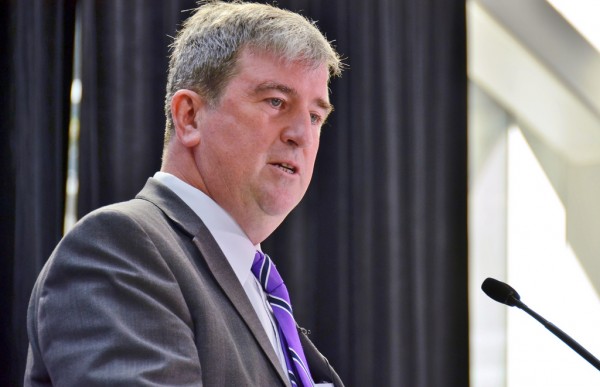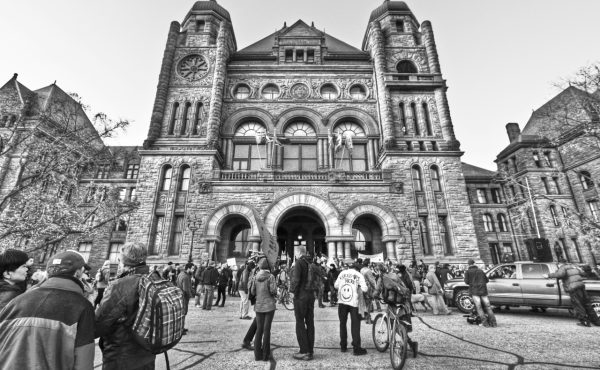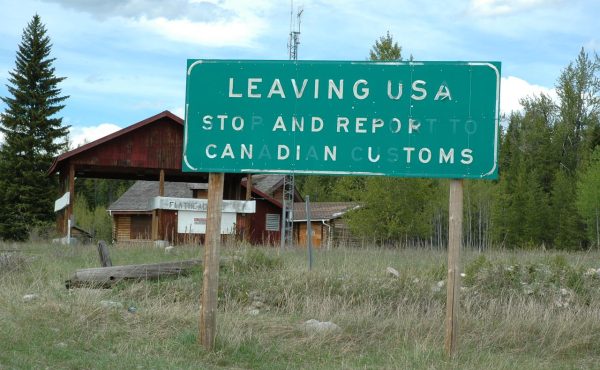
Everyone knows that Mayor Rob Ford likes revenue tools about as much as the Pride Parade. But when federal Tory finance minister Jim Flaherty waded, unbidden, into the debate last week, heads turned. In a pointed letter to his provincial counterpart Charles Sousa, Flaherty shot down “recent musings by the Wynne Government” that it might look to a regional increase in the HST to help finance the Big Move. Not on our watch, Flaherty declared, pointing out that regional hikes weren’t allowed under the federal-provincial HST agreement.
Sousa has called for a meeting with the Feds — of course. But the always entertaining game of inter-governmental whack-a-mole is a distraction from the main event. Over the summer, Liberal transportation minister Glen Murray will lead a taskforce to review the Metrolinx revenue tool proposals (HST, gas tax, parking levy and development charges) and come up with a legislative agenda. Last month, Murray got his knuckles rapped for casting doubt on Metrolinx’s presumed short-list on budget day. In an interview Friday, he didn’t sound any more upbeat about the proposed tools, and talked instead about far more modest techniques, such as “pay-as-you-go” financing (an idea that did not make even the long Metrolinx list [PDF]).
Of course, a savvy politician who knows his government plans to hit up voters with new taxes might be well advised to adopt a conspicuously reluctant pose to show voters that such moves are a last resort. Whatever his actual views, Murray will somehow have to recast his very public skepticism into genuine salesmanship by the fall if he hopes to deliver Premier Kathleen Wynne’s signature promise.
Spacing: How do you intend to make a case for asking people for more money to pay for the Big Move? Obviously, based on the polls, they are not yet convinced.
Murray: One wouldn’t expect them to be. There are some people who are saying, “this is an inordinately long process you’re involved in, you’re only going to start another conversation now.” And there are other folks who are saying, “you haven’t got a consensus yet.” Well, both are true.
We are now moving from a consultation Metrolinx has had, with a series of options they’ve presented. They’ve provoked criticism of those [recommendations] and other ideas. I will be leading a panel this summer that will be looking at all that criticism and looking at those other ideas. The government will take some ownership of this in the fall. Within the next twelve month, targeted by the 2014 budget, the government will declare its position and it will be my job to go out and ensure that it’s something that has reasonable support amongst Ontarians and people in the GTHA.
Spacing: Will you table legislation by budget 2014?
Murray: I think it’s within the next twelve months. Whether we proceed with the legislation before the next budget, in the fall, or whether we wait and introduce this with other budget measures, depends on the nature of the final recommendations.
Spacing: Do you see yourselves fighting an election on these revenue tools?
Murray: No, I see us fighting an election on building a high quality transit and transportation system in the GTHA that deals with congestion and makes this region economically more competitive and one that reduces the net cost to families. That $6 billion a year is being taxed out of their incomes and out of their businesses by congestion. [It] is a much more onerous burden than any investment we could make in transit.
Spacing: Could you react to Tory finance minister Jim Flaherty’s letter? He categorically ruled out a regional HST and spoke in somewhat disparaging terms about this process. What’s that about?
Murray: The federal government’s approach has been to really exclude provinces and municipalities from the kinds of vigorous conversations we had when we did the New Deal for cities and the five-cent-a-litre gas tax deal. Some of the problems we’re trying to solve are the ones he is the author of. So it took a little bit of chutzpah, to say the least, to come back and say flat out no.
Having the federal government come in as a modest partner — we put in $16 billion into transit infrastructure; if he would match that, that would be reasonable and give us less requirement for more funds. If he would be a partner in more than one Big Move project, we would have more choices. But his government has chosen not to invest in Toronto.
Spacing: The federal infrastructure funds announced this spring were raised using the income tax. Do you see your government revisiting the income tax as a means of raising the funds needed for The Big Move?
Murray: I think there are lots of things the government will look at in the coming months. No one has put the income tax as an idea on the table.
Spacing: But that’s the way the whole transit system was built in the first place, no?
Murray: I don’t know. There is a question about what is the best revenue tool, so we’ll be looking at that. I couldn’t comment on income tax or anything in particular. We will need a new revenue tool. Whether it’s congestion charges or payroll tax or sales tax or gas taxes, every single urban region that has tried to build a project on the scale we’re trying to do has had to introduce a revenue tool.
Spacing: Do you have a favourite one?
Murray: No, I don’t have a favourite. My expertise has been in pay-as-you-go financing. I know if we blend pay-as-you-go into this, we will reduce construction costs by billions of dollars over the 20 years. We worked with Metrolinx on the idea of a trust investment fund. We know that brings the cost down.
I’ve looked at Octopus and Hong Kong and how they get almost as much revenue from other uses of the card. So I think there are lots of other things we can do in addition to a new revenue tool. [But] I think that if we look at all those other things that have been suggested, it does not eliminate the need for a new revenue tool. [There] will be a thoughtful process over the summer, reflecting on the Metrolinx recommendations. There’s a lot of value in their report. But I also think it means listening to other experts. And we’ll be very mindful of not passing something that won’t have the support of the people who will have to pay for it.





One comment
Dodgy as ever Minister Murray again fails to directly answer questions. He needs to be forward with people and the media. Pay-as-you-go financing alone will get us no where because it will rely on taking out more unfunded debt which the province has strictly opposed doing. For him to say that he will be looking into this as a credible option flies in the face of what he says immediately there after, a new revenue source is needed.
To his credit however he has yet to rule out any tools which show at least a modicum of legitimacy to the way he is handling this file. After his less than favorable first impressions of the Metrolinx funding strategy lets hope he and the Libs can come up with something viable to fund this system.